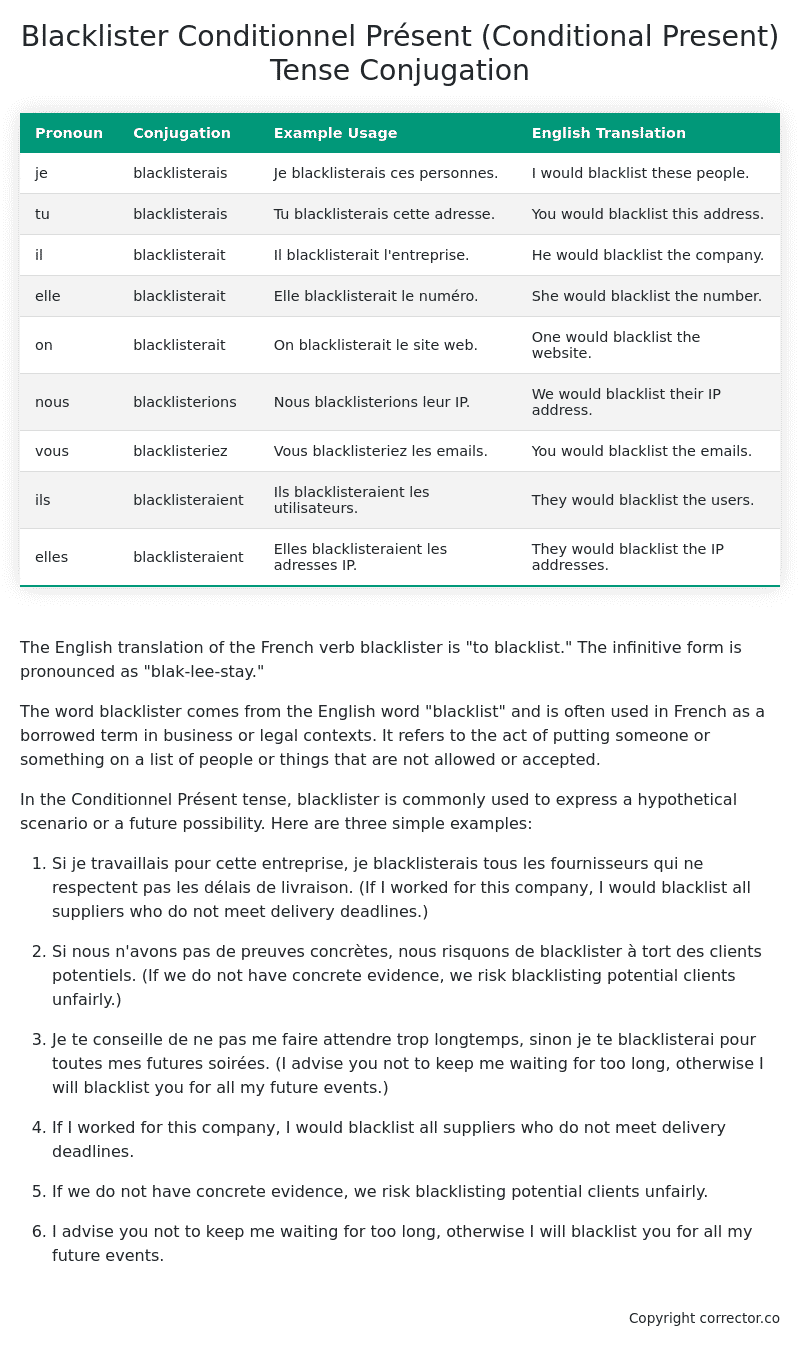Conditionnel Présent (Conditional Present) Tense Conjugation of the French Verb blacklister
Introduction to the verb blacklister
The English translation of the French verb blacklister is “to blacklist.” The infinitive form is pronounced as “blak-lee-stay.”
The word blacklister comes from the English word “blacklist” and is often used in French as a borrowed term in business or legal contexts. It refers to the act of putting someone or something on a list of people or things that are not allowed or accepted.
In the Conditionnel Présent tense, blacklister is commonly used to express a hypothetical scenario or a future possibility. Here are three simple examples:
-
Si je travaillais pour cette entreprise, je blacklisterais tous les fournisseurs qui ne respectent pas les délais de livraison. (If I worked for this company, I would blacklist all suppliers who do not meet delivery deadlines.)
-
Si nous n’avons pas de preuves concrètes, nous risquons de blacklister à tort des clients potentiels. (If we do not have concrete evidence, we risk blacklisting potential clients unfairly.)
-
Je te conseille de ne pas me faire attendre trop longtemps, sinon je te blacklisterai pour toutes mes futures soirées. (I advise you not to keep me waiting for too long, otherwise I will blacklist you for all my future events.)
-
If I worked for this company, I would blacklist all suppliers who do not meet delivery deadlines.
-
If we do not have concrete evidence, we risk blacklisting potential clients unfairly.
-
I advise you not to keep me waiting for too long, otherwise I will blacklist you for all my future events.
Table of the Conditionnel Présent (Conditional Present) Tense Conjugation of blacklister
| Pronoun | Conjugation | Example Usage | English Translation |
|---|---|---|---|
| je | blacklisterais | Je blacklisterais ces personnes. | I would blacklist these people. |
| tu | blacklisterais | Tu blacklisterais cette adresse. | You would blacklist this address. |
| il | blacklisterait | Il blacklisterait l’entreprise. | He would blacklist the company. |
| elle | blacklisterait | Elle blacklisterait le numéro. | She would blacklist the number. |
| on | blacklisterait | On blacklisterait le site web. | One would blacklist the website. |
| nous | blacklisterions | Nous blacklisterions leur IP. | We would blacklist their IP address. |
| vous | blacklisteriez | Vous blacklisteriez les emails. | You would blacklist the emails. |
| ils | blacklisteraient | Ils blacklisteraient les utilisateurs. | They would blacklist the users. |
| elles | blacklisteraient | Elles blacklisteraient les adresses IP. | They would blacklist the IP addresses. |
Other Conjugations for Blacklister.
Le Present (Present Tense) Conjugation of the French Verb blacklister
Imparfait (Imperfect) Tense Conjugation of the French Verb blacklister
Passé Simple (Simple Past) Tense Conjugation of the French Verb blacklister
Passé Composé (Present Perfect) Tense Conjugation of the French Verb blacklister
Futur Simple (Simple Future) Tense Conjugation of the French Verb blacklister
Futur Proche (Near Future) Tense Conjugation of the French Verb blacklister
Plus-que-parfait (Pluperfect) Tense Conjugation of the French Verb blacklister
Passé Antérieur (Past Anterior) Tense Conjugation of the French Verb blacklister
Futur Antérieur (Future Anterior) Tense Conjugation of the French Verb blacklister
Subjonctif Présent (Subjunctive Present) Tense Conjugation of the French Verb blacklister
Subjonctif Passé (Subjunctive Past) Tense Conjugation of the French Verb blacklister
Subjonctif Imparfait (Subjunctive Imperfect) Tense Conjugation of the French Verb blacklister
Conditionnel Présent (Conditional Present) Tense Conjugation of the French Verb blacklister (this article)
Conditionnel Passé (Conditional Past) Tense Conjugation of the French Verb blacklister
L’impératif Présent (Imperative Present) Tense Conjugation of the French Verb blacklister
L’infinitif Présent (Infinitive Present) Tense Conjugation of the French Verb blacklister
Struggling with French verbs or the language in general? Why not use our free French Grammar Checker – no registration required!
Get a FREE Download Study Sheet of this Conjugation 🔥
Simply right click the image below, click “save image” and get your free reference for the blacklister Conditionnel Présent tense conjugation!

Blacklister – About the French Conditionnel Présent (Conditional Present) Tense
Formation
Common Everyday Usage Patterns
Expressing Polite Requests
Expressing Hypothetical Situations
Expressing Doubt or Uncertainty
Interactions with Other Tenses
Present Tense
Past Tense
Future Tense
Conditional Perfect
Summary
Want More?
I hope you enjoyed this article on the verb blacklister. Still in a learning mood? Check out another TOTALLY random French verb conjugation!


